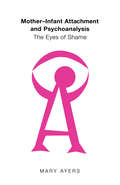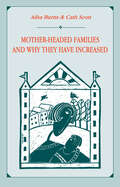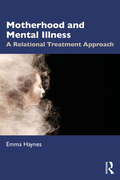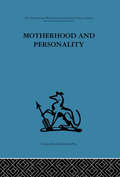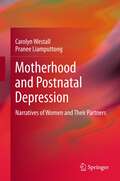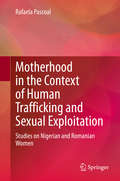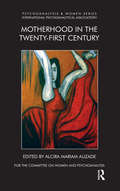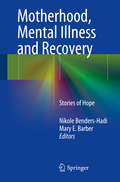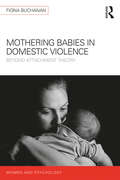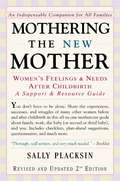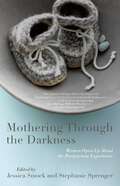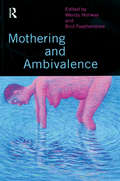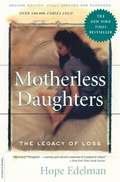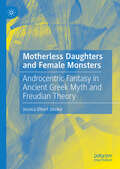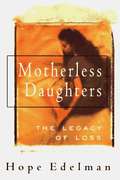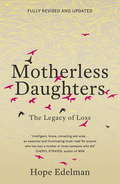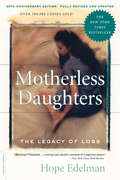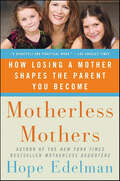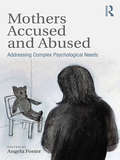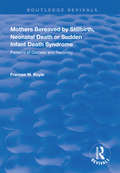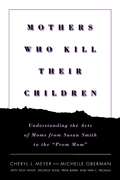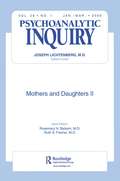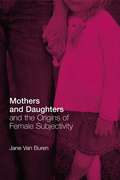- Table View
- List View
Mother-Infant Attachment and Psychoanalysis: The Eyes of Shame
by Mary Y. AyersWinner of the 2004 Gradiva Award from the National Association for the Advancement of Psychoanalysis. The issue of shame has become a central topic for many writers and therapists in recent years, but it is debatable how much real understanding of this powerful and pervasive emotion we have achieved. Mother-Infant Attachment and Psychoanalysis argues that shame can develop during the first six months of life through an unreflected look in the mother's eyes, and that this shame is then internalised by the infant and reverberates through its later life. The author further expands on this concept of the look through a powerful and extensive study of the concept of the Evil Eye, an enduring universal belief that eyes have the power to inflict injury. Finally, she presents ways of healing shame within a clinical setting, and provides a fascinating analysis of the role of eye-contact in the therapeutic encounter.This book brings together a unique blend of theoretical interpretations of shame with clinical studies, and integrates major concepts from psychoanalysis, Jungian analysis, developmental psychology and anthropology. The result is a broad understanding of shame and a real understanding of why it may underlie a wide range of clinical disorders.
Mother-headed Families and Why They Have Increased
by Catherine Scott Ailsa Burns Cath ScottThe last two decades have seen a dramatic growth in the proportion of families headed by women. Most of these families are poor and include dependent children--causing the development of a large underprivileged class across the western world. This book explores the causes and implications of this development. Because the increase in mother-headed families is an international trend, an international perspective has been adopted. The discussion centers on selected countries where certain trends are most visible. Among the western nations particular attention is given to the United States, Sweden, and the former U.S.S.R., because of their high prevalence of mother-headed families; and trends in some countries with a middling prevalence are also discussed. Japan is included, because of its combination of advanced industrialization with a non-western tradition and a low incidence of mother-headed families. Accordingly, the book considers broad supranational influences, and proposes some explanations that draw on material from history, anthropology, sociology, psychology, women's studies, economics, literature, and religious studies. The authors present definitive information on the incidence of mother-headed families across historical epochs and culture groups. This includes an exploration of the conditions under which such families have been many or few and have been treated well or poorly by their communities. They also offer some theoretical explanations for the increasing frequency of this family form and consider whether these interpretations fit the facts that have been gathered. Finally, there is a detailed discussion revealing what these explanations may imply for the future--that is, whether the number of mother-headed families is likely to increase, stabilize, or decrease.
Motherhood Missed: Stories from Women Who Are Childless by Circumstance
by Lois Tonkin Jody DayMany women expect to become mothers but are childless through social rather than biological reasons - perhaps they haven't met the right person or they prioritised career or education earlier in life. Featuring international interviews by grief counsellor and researcher Lois Tonkin, this collection of first-person stories provides insight into the under-discussed situation of being childless by circumstance.Each story highlights the different aspects of being childless by circumstance, as women move through their 30s, 40s, and 50s, and beyond their ages of fertility. The book explores feelings of grief and loss, and also how women adapt positively to their changed life expectations, finding excitement in the alternative, rich and complex shapes their lives have taken.
Motherhood and Mental Illness: A Relational Treatment Approach
by Emma HaynesMotherhood and Mental Illness offers an in-depth, comprehensive relational psychotherapeutic framework to provide effective treatment for those experiencing maternal mental illness. This book addresses a current deficit in mental health resources and treatment and is designed to be an accessible, practical guide into the types and manifests of disorders and the diagnosis, treatment and management of maternal mental illness. It gives a solid understanding of the nature and complexity of maternal mental illness and offers clear guidance on how to provide treatment for successful recovery. Then, using a relational approach, the book offers useful therapeutic interventions grounded in clinical experience and research, which are elucidated with case examples. Covering the most common presentations and the confounders (alcohol, single parenting, drug abuse, self-medication) this is a guide of how to plan treatment, common mistakes that can occur, myths that prevail, and ethical dilemmas. The book will be suitable for psychotherapists and counsellors of any modality as well as any healthcare professionals who have frontline contact with women.
Motherhood and Personality: Psychosomatic aspects of childbirth
by Léon Chertok M Bonnaud M Borelli J-L Donnet C Revault D'AllonnesTavistock Press was established as a co-operative venture between the Tavistock Institute and Routledge & Kegan Paul (RKP) in the 1950s to produce a series of major contributions across the social sciences. This volume is part of a 2001 reissue of a selection of those important works which have since gone out of print, or are difficult to locate. Published by Routledge, 112 volumes in total are being brought together under the name The International Behavioural and Social Sciences Library: Classics from the Tavistock Press. Reproduced here in facsimile, this volume was originally published in 1969 and is available individually. The collection is also available in a number of themed mini-sets of between 5 and 13 volumes, or as a complete collection.
Motherhood and Postnatal Depression
by Pranee Liamputtong Carolyn WestallGlobally, postnatal depression (PND) is a growing public health problem. PND affects 10 to 15% of women in Western society. It caused by a combination of biological, psychological and social factors. Two models have attempted to define and explain PND; the biomedical and the sociological models. The traditional biomedical model views PND as a medical condition which implies there is individual pathology and abnormality. Whilst the biomedical model has been the dominant model in treating PND, it has been criticized by feminist sociologists and psychologists for its rigidity in defining and explaining PND. In contrast, the psychosocial model of health acknowledges the biological factors that impact on emotional well-being, but places more emphasis on the personal and social factors that impact on emotional well-being, but places more emphasis on the personal and social factors that contribute to depressive symptoms such as gender, poverty, social disadvantage and social class. The central argument throughout this book is the importance of support before and after the birth for women's emotional well-being. This book will also include women's journeys through pregnancy, childbirth, motherhood, postnatal depression, and resolution. To date, literature has focused on women's lived experiences of PND rather than their personal journeys through pregnancy, childbirth and early motherhood. Additionally, the adjustment to fatherhood has received less attention. For example, little is known about the impact of postnatal depression on the partner, what support partners offer when women with the intention to fill the gap in knowledge of cultural and social issues relating to pregnancy, childbirth, and motherhood for woman who were diagnosed with, and had resolved, PND.
Motherhood in the Context of Human Trafficking and Sexual Exploitation: Studies on Nigerian and Romanian Women
by Rafaela PascoalThis book discusses motherhood of Nigerian and Romanian women in Italy and Romania, who are human trafficking victims for sexual purposes. It provides a broad gender approach to emerge on the phenomenon of human trafficking with an analytic perspective of all the social, cultural, legal and economic components that play an important role during all phases of motherhood. The book compares the motherhood of these two nationalities within a context of an illegal/legal status in the European territory. It reflects on the used terms of vulnerability, sexual exploitation, victim, resistance and resilience. This book enlightens scholars and students with a broad perspective on this complex phenomenon, understanding the intersectionality of the victims’ features and its relation with the several push and pull factors that lead a human trafficking victim into vulnerability, resistance and resilience.
Motherhood in the Twenty-First Century (Psychoanalysis and Women Series)
by Mariam AlizadeMothers in the twenty-first century confront us, both in clinical practice and in theory, with fascinating challenges that to some extent subvert the traditional maternal ideal: the motherhood of single women, motherhood in which the mother-child relationship seems minimal (in the case of very busy working mothers), teenage motherhood in which there is no true awareness of the maternal function, motherhood in couples of homosexual women, men who take upon themselves the maternal function (men-mothers), complex motherhood by virtue of the multiple variants that have nowadays become possible thanks to new reproductive techniques, shared motherhood, surrogate motherhood, sublimated motherhood and perverse motherhood.
Motherhood, Mental Illness and Recovery
by Nikole Benders-Hadi Mary E. BarberDespite the importance of regaining social roles during recovery from mental illness, the intersection between motherhood and serious mental illness is often overlooked. This book aims to rectify that neglect. A series of introductory chapters describing current research and services available to mothers with serious mental illness are followed by personal accounts of clients reflecting on their parenting experiences. One goal of the book is to provide clinicians with information that they can use to help patients struggling with questions and barriers in their attempts to parent. The inclusion of personal accounts of mothers on issues such as stigma, fears and discrimination in the context of parenting with a mental illness is intended to promote the message of mental illness recovery to a larger audience as well. Finally, it is hoped that this handbook will help inspire more research on mothers with mental illness and the creation of more services tailored to their needs.
Mothering Babies in Domestic Violence: Beyond Attachment Theory (Women and Psychology)
by Fiona BuchananThis unique book offers an innovative feminist critique of attachment theory that offers an alternative understanding of relationships between women and their babies in domestic violence. Fiona Buchanan identifies a way forward for working with women, babies and people who have grown up with domestic violence focusing on strengths not deficits. In doing so, she raises new possibilities for work with women and babies in other situations where trauma impacts on their relationships. In line with feminist traditions of listening to the voices of women, this book theorizes from research which asks women who birthed and mothered babies in domestic violence about their experiences. The research identifies that women respond with protectiveness when faced with sustained hostility from their partners and protected their babies in many ways not recognised by attachment theorists. However, sustained hostility often targets the growing relationship between women and their babies and limits space for the woman and baby to peacefully relate. This book offers deep insights and a new model for working with women, babies and those who have grown up with violence based on understanding the context of sustained hostility, appreciating women’s protectiveness and expanding space where women and babies can relate. The author calls for practitioners across health and welfare settings to explore the situations in which women mother; women’s protective thoughts feelings and actions and how they find space to relate. This is the ideal resource for researchers, policy makers and practitioners, as well as women and people who grew up with domestic violence.
Mothering The New Mother: Women's Feelings And Needs After Childbirth - A Support And Resource Guide (Parenting Guides)
by Sally PlacksinFor the expectant and new mom, freshly updated and designed, this acclaimed all-in-one support guide focuses on all aspects of the postpartum experience. The nine chapters in this comprehensive guide include resources, networks, information, stories, and advice to nurture, validate, and empower the new mother, whether she is having her first baby or her third. Among the subjects covered are: what to expect when you go home; what is this period called "postpartum" and how long does it last; where to find breastfeeding help; how to ask for help; homecare options; what are realistic going-back-to-work options; how to relieve the isolation of at-home mothers; what to say (and not to say) to family members. Drawn from three years of research and the author's own experience, each chapter is filled with the practical suggestions and hands-on solutions provided by doctors, nurses, midwives, other caregivers, policymakers, and over 100 new mothers. Also included are many real-life stories told by women in their own voices; checklists; a prenatal and postpartum questionnaire to help assess and plan needs; reading lists; resource listings; and a separate chapter for second-, third-, or more-time moms.
Mothering Through the Darkness: Women Open Up About the Postpartum Experience
by Stephanie Sprenger Jessica SmockApproximately 1 in 7 women suffer from postpartum depression after having a baby. Many more may experience depression during pregnancy, postpartum anxiety, OCD, and other mood disorders. Postpartum depression is, in fact, the most common pregnancy-related complication—yet confusion and misinformation about this disorder are still widespread. And these aren&’t harmless myths: the lack of clarity surrounding mothers&’ mental health challenges can have devastating effects on their well-being and their identities as mothers, which too often leads to shame and inadequate treatment. In this one-of-a-kind anthology, thirty mothers break the silence to dispel myths about postpartum mental health issues and explore the diversity of women&’s experiences. Powerful and inspiring, Mothering Through the Darkness will comfort every mother who&’s ever felt alone, ashamed, and hopeless—and, hopefully, inspire her to speak out.
Mothering and Ambivalence
by Wendy Hollway Brid FeatherstoneChildren's rights, lone motherhood and the breakdown of families are all issues at the forefront of current social debate in the West, with little agreement on what constitutes good parenting, or how the needs of both mother and child are best met. The feminist contribution to this debate is particularly important in keeping in view the diverse identities of all those who provide mothering. The psychoanalytic contribution is often undervalued and misunderstood. Mothering and Ambivalence brings together authors from therapeutic, academic and social work backgrounds to discuss dependency, anxiety and gender relations within families. Drawing on extensive professional experience the contributors combine a psychoanalytic and feminist approach to mothering which transcends the polarized and simplistic political debate about women's and children's needs. They also show how such an approach can inform and improve professional practice.
Motherless Daughters
by Hope EdelmanAn instant bestseller in both hardcover and paperback, Hope Edelman'sMotherless Daughtersexplores the myriad ways that losing a mother can affect almost every aspect and passage of a woman's life. First published a decade ago, it is still the book that motherless daughters of all ages look to for understanding and comfort and that they press into each other's hands. Building on interviews with hundreds of mother- loss survivors, this life-affirming book is now newly expanded to reflect the author's personal experience with the continued legacy of mother loss; now married and a mother of young children herself, Edelman better understands how the effects of mother loss change over time and in light of new relationships. A work of stunning courage and honesty,Motherless Daughtersis a must read for the millions of women whose mothers have gone, but whose need for healing, mourning, and mothering remains. It is a timeless classic.
Motherless Daughters
by Hope EdelmanAn instant bestseller in both hardcover and paperback, Hope Edelman's Motherless Daughters explores the myriad ways that losing a mother can affect almost every aspect and passage of a woman's life. First published a decade ago, it is still the book that motherless daughters of all ages look to for understanding and comfort and that they press into each other's hands. Building on interviews with hundreds of mother- loss survivors, this life-affirming book is now newly expanded to reflect the author's personal experience with the continued legacy of mother loss; now married and a mother of young children herself, Edelman better understands how the effects of mother loss change over time and in light of new relationships. A work of stunning courage and honesty, Motherless Daughters is a must read for the millions of women whose mothers have gone, but whose need for healing, mourning, and mothering remains. It is a timeless classic.
Motherless Daughters and Female Monsters: Androcentric Fantasy in Ancient Greek Myth and Freudian Theory
by Jessica Elbert DeckerThis book is a feminist analysis of Greek myth and tragedy that reimagines the structures of Freudian theory. The objective of this analysis is political—by revealing the structures that undergird patriarchal oppression, feminist thinkers can work to transform these symbolic constellations through the work of sabotage, parody, and imagination. Jessica Elbert Decker attempts here to read Freudian theory through a wider lens of Ancient Greek culture, since our contemporary philosophical and social culture has inherited many of its symbolic structures (e.g., patriarchy, binary thinking). The major argument of the book is that our Western philosophical, social, and symbolic systems are, as they were in the Ancient Greek world, suffused with a set of values that reflect one version of masculinity and androcentrism, and that those values are destructive to human beings as well as the non-human world, including other beings.
Motherless Daughters: The Legacy of Loss
by Hope EdelmanA classic bestseller, now newly expanded and updated-- the book that first acknowledged "mother loss," a woman's most profoundly life-altering passage. The author devotes a chapter to 11 subjects related to mother loss, ranging from when sisters raise siblings to when a motherless daughter becomes a mother.
Motherless Daughters: The Legacy of Loss
by Hope EdelmanAsk any woman whose mother has died, and she will tell you that she is irrevocably altered, as deeply changed by her mother's death as she was by her mother's life.Although a mother's mortality is inevitable, no book had discussed the profound, lasting and far-reaching effects of this loss - until Motherless Daughters, which became in instant classic. Over twenty years later, it is still the book that women of all ages look to for comfort and understanding when their mothers die, and the book that they continue to press into each other's hands.Building on interviews with hundreds of mother-loss survivors, the author's personal story of losing her mother and recent research in grief and psychology, Motherless Daughters reveals the shared experiences and core identity issues of motherless women.* * * * * * *'Motherless Daughters is a timeless source of consolation and information for all who grieve the death of their mother. It highlights that we bear this loss by remembering, not forgetting our mother.' JULIA SAMUEL, author of Grief Works'Anyone who has lost their mother should read this remarkable, tender book, full of insight and consolation. This is one of those exceptional books that has the power to change your life.' CLOVER STROUD, author of The Wild Other'Nothing has helped me make more sense of myself than Motherless Daughters; it's the book I go back to again and again, and find something new in it every time.' DECCA AITKENHEAD'Intelligent, brave, consoling and wise . . . an essential and illuminating must-read for anyone who has lost a mother or loves someone who did.' CHERYL STRAYED, author of Wild'This book has helped me heal my heart. Finding myself in the stories of other motherless daughters let me know I was not alone. If you have lost your mom - this book is essential.' ROSIE O'DONNELL'Absorbing . . . insightful . . . a moving and valuable treatment of a neglected subject.' NEW YORK TIMES BOOK REVIEW
Motherless Daughters: The Legacy of Loss, 20th Anniversary Edition
by Hope EdelmanThe 20th Anniversary edition of the "New York Times" bestseller, with a new afterword by the author.
Motherless Mothers: How Losing a Mother Shapes the Parent You Become
by Hope Edelman"Edelman illuminates the transformative power of understanding mother loss [and] offers essential wisdom." — Library JournalWhen Hope Edelman, author of the New York Times bestseller Motherless Daughters, became a parent, she found herself revisiting the loss of her mother in ways she had never anticipated. Now the mother of two young girls, Edelman set out to learn how the loss of a mother to death or abandonment can affect the ways women raise their own children.In Motherless Mothers, Edelman uses her own story as a prism to reveal the unique anxieties and desires that these women experience as they raise their children without the help of a living maternal guide. In an impeccably researched, luminously written book enriched by the voices of the mothers themselves—and filled with practical insight and advice from experienced professionals—she examines their parenting choices, their triumphs, and their fears, and offers motherless mothers the guidance and support they want and need.
Mothers Accused and Abused: Addressing Complex Psychological Needs
by Angela FosterMothers Accused and Abused: Addressing Complex Psychological Needs brings together stories about mothers who are accused of harming, and in some cases killing, their children, children who subsequently harm or kill others and the challenges to professionals who work with them. Contributors consider the deeply rooted cycles of neglect and abuse manifested in the childhoods of mothers, who only come to our attention when their extreme distress is expressed through their actions. By recognising the long-standing, unmet dependency needs of abused and neglected women, the book argues that longer term engagement can prevent a seemingly endless repetition of court hearings and imprisonment, and thereby address cycles of neglect. With sections on mothers in prison and interventions following child care proceedings, Mothers Accused and Abused will be a valuable resource to those working in the criminal and civil justice systems, social work and mental health as well as others who, in a professional or personal capacity, encounter troubled mothers and their children.
Mothers Bereaved by Stillbirth, Neonatal Death or Sudden Infant Death Syndrome: Patterns of Distress and Recovery (Routledge Revivals)
by Frances M. BoyleFirst published in 1997, this volume studied families bereaved by perinatal or infant death, including factors both preceding and following the experience and its effect on areas such as marriage, mental health and future conception, based on interviews with 194 women living in south-eastern Queensland, Australia. Tracing the natural history of the first thirty months of their loss, all mothers completed semi-structured interviews and standardized questionnaires at two, eight, fifteen and thirty months following the baby’s death. The study aims to explain and explore these effects and to suggest some potential recommendations for the care and support of women who experience stillbirth, neonatal death or SIDS.
Mothers Who Kill Their Children: Understanding the Acts of Moms from Susan Smith to the "Prom Mom"
by Cheryl L. Meyer Michelle ObermanAn inside look into patterns and potential prevention plans for one of the most hotly sensationalized crimesA special kind of horror is reserved for mothers who kill their children. Cases such as those of Susan Smith, who drowned her two young sons by driving her car into a lake, and Melissa Drexler, who disposed of her newborn baby in a restroom at her prom, become media sensations. Unfortunately, in addition to these high-profile cases, hundreds of mothers kill their children in the United States each year. The question most often asked is, why? What would drive a mother to kill her own child? Those who work with such cases, whether in clinical psychology, social services, law enforcement or academia, often lack basic understandings about the types of circumstances and patterns which might lead to these tragic deaths, and the social constructions of motherhood which may affect women's actions. These mothers oftentimes defy the myths and media exploitation of them as evil, insane, or lacking moral principles, and they are not a homogenous group. In obvious ways, intervention strategies should differ for a teenager who denies her pregnancy and then kills her newborn and a mother who kills her two toddlers out of mental illness or to further a relationship. A typology is needed to help us to understand the different cases that commonly occur and the patterns they follow in order to make possible more effective prevention plans. Mothers Who Kill Their Children draws on extensive research to identify clear patterns among the cases of women who kill their children, shedding light on why some women commit these acts. The characteristics the authors establish will be helpful in creating more meaningful policies, more targeted intervention strategies, and more knowledgeable evaluations of these cases when they arise.
Mothers and Daughters II: Psychoanalytic Inquiry, 26.1
by Melvin Bornstein Donald SilverThis is the second issue of Psychoanalytic Inquiry devoted to mothers and daughters. This project began as the mother-daughter bond was calling out for attention in light of the many advances in our understanding of female psychology. The goal of female development is no longer considered to be a severing of the mother-daugher bond to attain autonomy and sexual maturity. What, then, are its vicissitudes as it is revisited, reworked, and transformed as the girl and her mother grow and develop and ultimately attain a state of interdependence? The relational context of development is now considered: gender-related differences in behavior and in parental interaction; and the girl's special relationship with her mother and her mother's body and the importance to her of her own body with its special attributes, contours, and sensations.
Mothers and Daughters and the Origins of Female Subjectivity
by Jane Van BurenMothers and Daughters and the Origins of Female Subjectivity challenges the theory of the Oedipus complex, which permeates psychoanalytic theory, psychology, semiotics and cultural studies. The book focuses on the re-examination of women’s development through the theories of primitive mental states. Women’s subjectivity has been profoundly limited by continuing anxieties about the mother’s body. Jane Van Buren describes how women are gradually escaping the curse of inferiority and finding a voice, enabling the mother to provide their daughters with a legacy of rightful agency over their bodies and minds. Drawing on the theories of Klein, Bion and Winnicott, and incorporating recent developments in psychobiology, this book provides a novel approach to subjects including the dreams, myths and phantasies of individuals, the nature of mother and daughter relationships, sexuality, pregnancy, menstruation and the idea of the mother’s body as problematic and dangerous. This interdisciplinary investigation into curtailed female subjectivity and its many ramifications in society, culture and individual mental growth will be of great interest to all practising psychoanalysts, and those studying psychoanalytic theory and gender studies.
